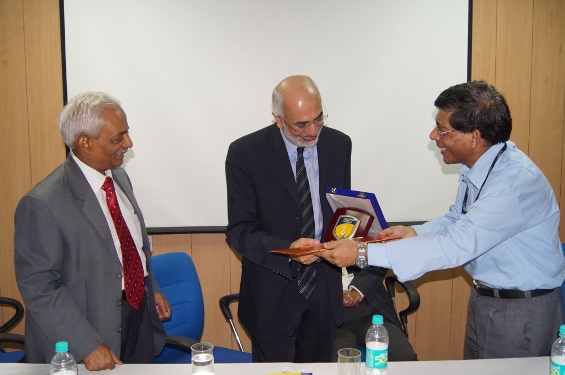08 Aug 2014|Noida | Amity University Campus, Sector-125, Noida
Prof. Thabit A.J. Abdullah- York University, Canada delivers lecture on "The Social Fragmentation of Iraq" at Amity University

Prof. Thabit A.J. Abdullah-Associate Professor of Middle East History and Associate Dean for External Relations at the Faculty of Liberal Arts and Professional Studies, York University in Toronto, Canada visited Amity University, Sector-125, Noida and delivered an interesting lecture on "The Social Fragmentation of Iraq".
Prof. Abdullah was born and raised in Baghdad, Iraq. He has written numerous publications primarily dealing with the medieval and modern history of Iraq. His most recent books are Merchants, Mamluks and Murder: the Political Economy of Trade in Eighteenth Century Basra ; A Short History of Iraq from 636 to the Present ; and Dictatorship, Imperialism and Chaos: Iraq Since 1989. These books were translated into numerous languages including Arabic, Spanish, Italian and Chinese.
Dr W Selvamurthy- President, Amity Science, Technology and Innovation Foundation welcomed the distinguished guest and introduced him to the audience comprising of students and faculty members.
Addressing the gathering, Prof. Thabit A.J. Abdullah thanked Amity University for inviting him to share his research work on Medieval and modern Iraq amidst such intellectual audience. Tracing the illustrious history of Iraq, the speaker said that the Iraq became independent in 1936 with high expectations. The Great League of Nations concurred that Iraq had all the requisites for rapid progressive development including its sound agricultural base, educated middle class, skilled labour force ,existence of oil fields and two great rivers-The Tigris and The Euphrates. He lamented that the country which once started afresh with high optimism is now on the verge of total collapse.
Citing potential reasons behind the Social Fragmentation of Iraq, Prof. Abdullah stressed that Saddam Hussein's dictatorship, which was unique in its ferocity, affected the country in worst possible manner. He projected himself as "Necessary Leader of Arab country" who had the audacity to enter into the private lives of individuals. The speaker further shared that according to Legal standards under Saddam Hussein, any individual who criticized State Institutions such as School, Hospital etc was to be condemned and put in jail. "His dictatorship created an environment of fear and strained the social relationships in Iraq." averred Prof. Abdullah.
The speaker pointed out the stifling effect of 13 years of stringent Sanctions placed against Iraq by United Nations in 1990 which involved total financial and trade embargo. The Sanctions, he stressed, destroyed the most productive middle class and skilled professionals, leading to gradual lawlessness in the country. The culture of crime and criminality became deeply imbedded into the society.
Sharing another potential factor leading to Social Fragmentation in Iraq, Prof. Abdullah highlighted the three major wars faced by Iraq including 8 years long continuous war with Iran, Gulf War in 1991 and the most heinous American War and subsequent invasion of Iraq by Americans in 2003. He shared that all these Wars battered Iraq beyond contemplation and never provided it the opportunity to re-surge and regain its lost glory.
He admired the remarkable persistence of the people of Iraq to hold on under such tumultuous situations and expressed his sincere hope that sooner the things will change in Iraq, making it once again a progressive, wealthy and promising Country.
The lecture was followed by interactive session wherein curious students and faculty members posed a volley of questions to the speaker who responded to them elaborately.